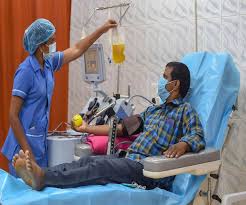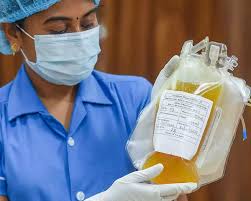
As Covid-19 wreaks havoc across the country, thousands of patients and caregivers continue to search for plasma donors—despite a lack of scientific evidence to prove that it’ll work against the disease.
Every day, countless calls on social media ask for plasma from a particular blood group, often for critical patients in the ICU. Those who have already donated plasma have been encouraging others to donate before getting vaccinated. Brands like dating app TrulyMadly and e-commerce website Snapdeal have jumped on this bandwagon to facilitate plasma donations.

However a government appointed task force on Covid-19 on Monday removed plasma therapy from the treatment protocol for adult Covid-19 patients. In the revised clinical guidelines for management of adult Covid-19 patients, use of convalescent plasma therapy has been removed even as an ‘off label’ treatment.
Until now, India’s Covid-19 treatment protocol allowed ‘off label’ use of convalescent plasma therapy but only at the stage of early moderate disease, that is, within seven days of the onset of symptoms, and if there is availability of a high titre donor plasma.
The Covid-19 treatment protocol is prepared in consultation with the Indian Council of Medical Research, AIIMS New Delhi, among others.
In the early months of the Covid-19 pandemic, plasma therapy became popular as a ‘treatment’ for Covid-19 and something that was thought to be effective in preventing progression of a case from moderate to severe.
However, as more research was carried out, it has now been evidenced that plasma therapy is not effective on Covid-19 patients in reducing or containing the severity of infection.
Last Friday, in a meeting of the ICMR-National Task Force for Covid-19, all members were in favour of removing the use of convalescent plasma from the Clinical Guidance for Management of Adult Covid-19 Patients. The members reportedly cited its ineffectiveness and inappropriate use in several cases.

Health professionals write letter to The Principal Scientific Advisor with copy marked to ICMR and AIIMS Director
The decision to remove it from the guidelines comes in the backdrop of some clinicians and scientists writing to Principal Scientific Advisor K VijayRaghavan cautioning against the “irrational and non-scientific use” of convalescent plasma for Covid-19 in the country.
In the letter, which was also marked to ICMR chief Dr Balram Bhargava and AIIMS Director Dr Randeep Guleria, public health professionals alleged that the current guidelines on plasma therapy are not based on existing evidence and pointed out some very early evidence that indicates a possible association between emergence of variants with “lower susceptibility to neutralising antibodies in immunosuppressed” people given plasma therapy.
“We are writing to you as concerned clinicians, public health professionals and scientists from India about the irrational and non-scientific use of convalescent plasma for Covid-19 in the country. This has stemmed from guidelines issued by government agencies, and we request your urgent intervention to address the issue which can prevent harassment of Covid-19 patients, their families, their clinicians and Covid-19 survivors,” said the letter.
It added that the current research evidence “unanimously indicates” that there is “no benefit offered by convalescent plasma for treatment of Covid-19”.
Plasma therapy can lead to newer variants
Though still no scientific study to substantiate it ,unchecked use of plasma in Covid-19 patients can potentially lead to new mutations in the virus. India, which is currently dealing with a deadly second wave, now has two variants of concern. There are likely to be more .
If we logically think , the ICMR’s current guidelines place plasma as a low-priority experimental treatment, to be administered only in the first two to three days of symptom onset. But plasma needs to be administered in a hospital setting, and rarely does anyone testing positive for Covid-19 is hospitalised in the first couple of days since their symptoms start.
Report- Vikas Chandra Agrawal